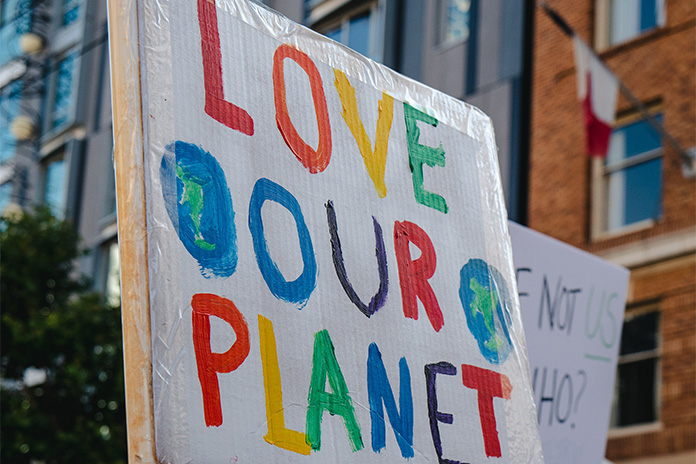
AFTER successive rocky years, 2023 is also going to limp out battered, bruised and further wartorn.
What’s 2024 got to offer?
Ships in a storm will strive to seek safe harbour to drop anchor, but where are these quiet ports?
Canvas8 has gathered opinions from 49 industry observers to plot a safe course through 2024, with enough points to anchor us in times of trouble.
The ‘threat monitor’ gauges current trends on climate change, finance, sociopolitical affairs and technology, capturing current sentiment and giving suggestive glimpses of the near future.
Polarisation on Climate Change
Countries across the world are experiencing record highs in temperature and seemingly more extreme weather. While some are skeptical of the origin or severity of the weather changes, other are preaching apocalyptic consequences, lost islands and swallowed coastlines, mass migration and unrest, loss of biodiversity, the end of life on this planet as we have known it. Generally, polls show a high percentage of Gen X, Y, Z and Boomers are concerned about changing weather patterns.
But how to maintain current lifestyle standards while sacrificing for the future of the planet? And, why is it, politicians who campaign for net zero targets also utilise private jets, escort convoys and other displays of hypocrisy that stoke the fires of conspiracy?
Although the stats would portray this as an unpolarised topic, experts note that the radical minority are likely to engage in greater and more extreme pushback over time. The predicted rise in sea level of 4–10 metres by the end of the century is of particular concern for islands such as Singapore and countries with much low-lying land.
The optimistic view is that we lie in the wake of a wave of innovative, climate friendly businesses, which some would shove under the umbrella of ‘greenwashing’, many of which aim to use more green friendly products or practices, while also taking it easy on our wallets. However, it must be acknowledged that these would be but a plaster.
The most damning consequence of the climate crisis would be the slowdown in development and growth in all other areas as significant minds, manpower and finances are devoted to overcoming climate-related issues.
Cultural Detachment
People are generally engaging more in leisure activities and spending less time working. While this may paint a Utopian picture, such shifts in workforce priorities could also suggest a tight job market. Rather than AI squeezing demand, it is the supply side that is dwindling. Businesses are struggling to retain employees as loyalty wanes.
This trend also appears in the markets, as brand loyalty drops as consumers become overwhelmed with advertising content. Tired from excessive bombardment customers are rationally settling for the most affordable and convenient alternatives. With this more frugal behaviour comes greater consumer power.
Nonita Kalra, editor-in-chief at Tata CliQ Luxury, believes that the days of monolithic brands dictating terms to their customers is over. She explains that in this new environment, businesses can gain a competitive edge by focusing on ‘co-creation with their customers’.
ALSO READ: The Perils Of Populism
Volatility in Foreign Leadership
While the local low in positive leadership sentiment was likely early in the pandemic, leadership volatility seems to be another lingering global trend. Even when leaders are holding their own, many are being forced to pivot to deal with shifts in the geopolitical environment. Drastic changes are polarising populations and, in some cases, creating a sense of anarchy.
Notable examples include Rishi Sunak’s rollback of climate change ambitions and implications for green tech manufacturers, as well as the abandonment of multi decade plans to build high-speed rail, seemingly in a bid to curry favour for the coming election. Meanwhile other leaders may also backtrack on climate targets.
While de-globalisation has been fresh on the lips of many, the world is still deeply interconnected, and crises and disturbances abroad can have unpredictable and far-reaching consequences.
Go Woke, Go Broke — DE&I Rollback
The fact that many would not be able to decipher the DE&I abbreviation speaks to the numerous failures of the movement. Concepts of Diversity, Equity and Inclusion are quickly becoming a rotting fad, rather than the impactful movement intended.
Faith in the commitment of businesses is also waning, as many brands, particularly in the fashion and beauty industry backpedal on their diverse branding, with their flip-flopping coming across as hypocritical as they pretentiously champion yet another fad.
It is likely that the true meaning and objectives of DE&I got lost somewhere along the way. Many hope the true intentions of this movement will be rediscovered before the movement completely loses credibility.

AI in the workplace
The rise of ChatGPT has led to fears of workers being made obsolete. While many employers are optimistic that AI could help optimise their business, 47% of people globally have expressed worry about the future implications of AI.
Omar H. Fares, lecturer at the Ted Rogers School of Retail Management, believes companies will have to put significant effort into explaining their technologies to combat such fears and that the focus should be on education rather than adoption.
AI has also shone a spotlight on workplaces with poor labour conditions, heightened tensions have notably resulted in protests by Ford factory workers. The message here is that workers worldwide want a greater premium on human value, however this is in stark contrast to the eternal cost-cutting principles of historically successful businesses.
It is likely, traditional business models will likely have to be revisited to better accommodate human workers. For example, machines could work at night, allowing human workers to get proper rest and being compensated with some of the profits from their AI driven counterparts. But it will take some time to reach a state where all parties are satisfied, and the role of AI has a clearly defined role in the workplace.
AI in media
In more polarised societies such as the US, local media is rapidly losing its reputation. Over half of Americans believe that their national news organisations intend to mislead and misinform the public to push divisive narratives, and over 70% of the citizens of the UK and Germany with some understanding of AI and deepfakes are worried about their implications. The confusion and horsepower of AI in terms of its ability to create convincing writing and images will likely further enhance this mistrust in the near term.
Singapore itself passed an ambitious fake news law to attempt to stifle the wave locally as it took global news by storm. The potential versatility of AI driven fake news will likely offer pushback and create a war of attrition with the truth, guerilla warfare where the enemy is shrouded in a forest of data and has no obvious visage.
But a lack of trust driven by AI could extend well beyond the traditional media to marketing, businesses, and brands. The authors anticipate further moderation and safeguarding to prevent further ‘reality split’. In an attempt to alleviate the confusion, companies such as Ogilvy are working to label all AI-generated influencer accounts and marketing campaigns. Making such distinctions will be crucial in maintaining trust in the coming tech revolution.

Cyber Security
How many passwords do you have and how long are they? Do you use a password manager? How often do you delete your cookies? Do you click on links in miscellaneous emails?
Navigating the digital space, even from the comfort of your inbox has already become a minefield. Even major organisations and tech companies are struggling, with attacks on the Australian government, CEO resignations after sensitive data leaks, and the biggest theft in Microsoft’s history.
One in 31 organiations worldwide experienced a ransomware attack each week during the first quarter of 2023, and with cyber security breaches costing $4.45 million on average, this trend seems to be up only, with its reach rapidly becoming more widespread.
The rise of AI will also see businesses become more vulnerable to ‘data poisoning’ and other competitive malpractices. While businesses struggle, retail may gradually lose trust in technology, with many believing it’s already too difficult to protect data online.
There will need to be a renewed focus on both reeducating people in safe online practices and mechanisms put in place to protect people, without making them feel stifled or babied as they navigate the web.
ALSO READ: The Psychology Behind Making Decisions
Financial Worries
While the boom that followed the pandemic temporarily relieved financial panic, lingering issues, namely inflation and job market uncertainty seem to be less transitory than expected. For the past year, many have been anticipating a global recession, and while one has yet to rear its ugly head, the persistent squeeze of living standards has many worried about the future.
Worldwide, 89% of people are worried about job loss and 74% of people are concerned about inflation, while just 40% of people believe they and their families will be better off in five years; a significant decline from 2022.
As we chart this new financial territory in an anticipated era of heightened pessimism, the authors note that personalised financial support will become more important than ever. While previous generations may be more steadfast in this time, personal finance expert Paco de Leon notes that younger generations who have only ever known economic prosperity may not adapt well to the changing climate.
“I think Gen Y is equipped with delusion because that’s the environment we grew up in — we were told we could do anything, that the world is our oyster, and anything is possible. We reacted to the 2008 housing crisis and the Great Recession through technology and socialism in the private sector with services like Uber and Airbnb. We found ways to make things work and stay helpful.”
The previous decades have seen people soothe their worries with lavish purchases, however such possessions will bring their owners more stress in times of prolonged uncertainty.
In a world where 51% of Gen Z and 52% of Gen Y are reported to be living paycheck to paycheck and persistent inflation, the authors foresee a shift in product branding along with consumer attitudes.
There will be an even greater focus on personal finance education and ‘rental economizing’ with car sharing and other such platforms encouraging an attitude of ‘Old is New’.
Or, in the charming words of the World Economic Forum: “You will own nothing and be happy.”





















